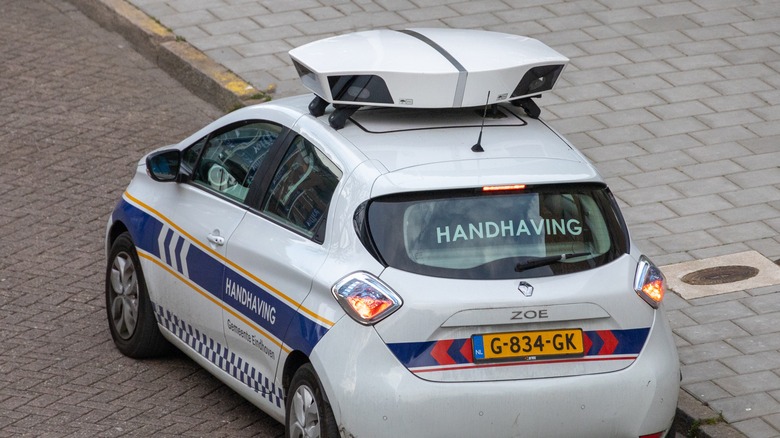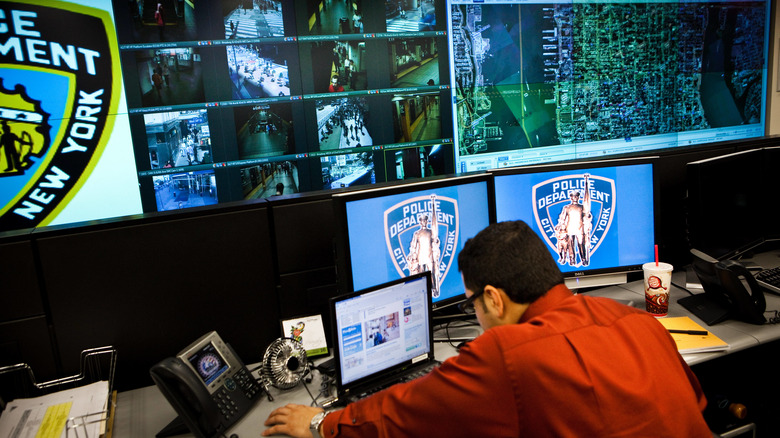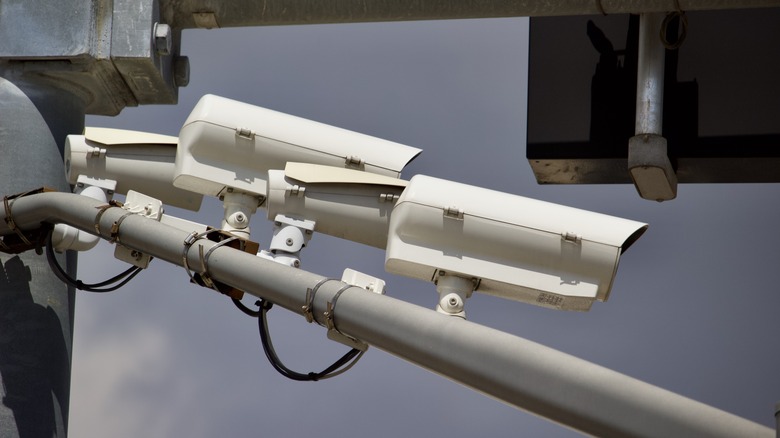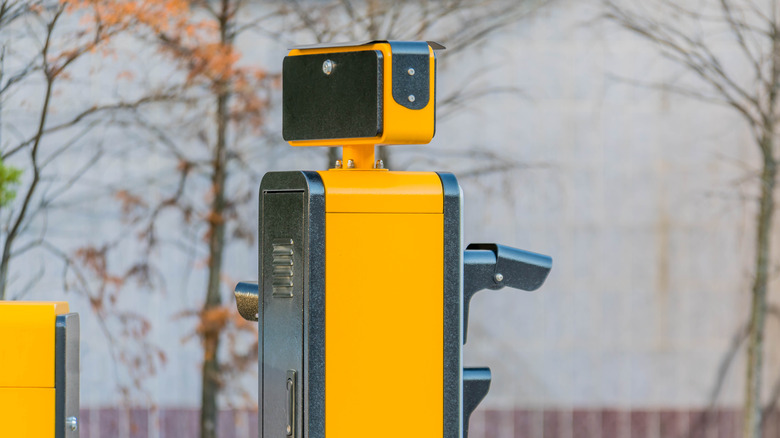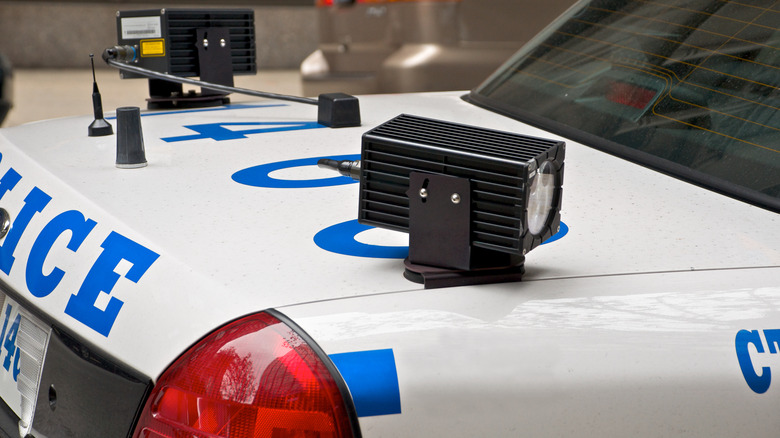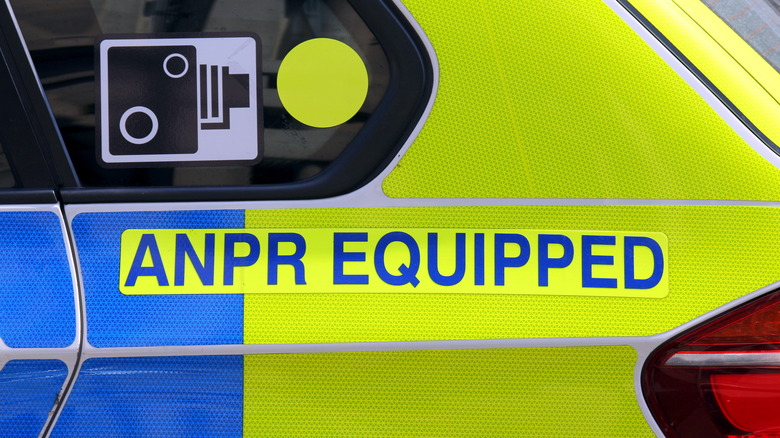How AI Is Helping Police Track Millions Of License Plates A Day
The 21st century is no stranger to surveillance, but with the advent of AI tools, a whole new world of criminal and government-funded tools has popped up on the scene. The sketchy track record of state agencies deploying surveillance tools beyond what is publicly authorized has really raised alarms. However, it's not always the doom and gloom scenario when it comes to using these advanced AI-fueled tools.
One such application is the identification and tracking of vehicles using their license plates. The tech — popularly known as Automatic License Plate Recognition (ALPR) — might seem like a fairly straightforward tool for assessing and matching license plates across a large database that is in the hands of law enforcement authorities. But it seems to be doing a lot more than that. According to documents accessed by Forbes, law enforcement is using it to glean additional details such as the color, make, and model of a vehicle.
Going a step further, the tech is even used to assess the driving pattern of a vehicle and accordingly surmise whether it exhibits signs of suspicious conduct. The cameras powering the ALPR surveillance come in mobile (tethered to a vehicle) and stationary (mounted on poles and signs) versions. They are said to scan millions of vehicles, with the dataset subsequently sold to law enforcement authorities across different states. As per Forbes, one of the companies engaged in developing ALPR gear is Rekor, which has reportedly sold the tech to nearly a dozen police departments and government agencies.
How ALPR works?
ALPR hardware can be stationary and mobile. In its fixed form, it can be mounted on traffic lights, telecom cable poles, building entrances, and exit ramps. It can also be clubbed with traffic lights and speed rule enforcement systems. In its mobile form, it can be mounted atop police cars, allowing law enforcement officials to capture license plates as they drive around in their jurisdiction areas.
According to the Electronic Frontier Foundation, private players such as Vigilant Solutions are hired as government contractors, click license plate visuals using mobile ALPR kits, and then hand over that data to the police and other government agencies.
The advanced ALPR kits also rely on AI-assisted upscaling and pixel-level visual reconstruction. This way, they can more accurately glean the alphanumeric information printed on a license plate from a long distance or in instances of a fast-moving vehicle that makes it difficult to lock focus.
According to a paper released by the National Institute of Justice in 2019, AI powering ALPR systems can rely on the intentional degradation of letters and numbers gleaned from high-quality images and are then compared against grainy or blurry photos to identify license plates.
How AI is supercharging ALPR?
Aside from law enforcement and government agencies, one of the biggest ALPR customers happens to be financial recovery outlets like banks, credit analysis agencies, and insurance claim brands. AI is only making these ALPR systems more accurate. Canada's Genetic, one of the biggest suppliers of aligned gear, has started using Intel silicon in its next-gen ALPR hardware and increasingly focuses on AI smarts to enhance ALPR capabilities.
The AI ethics board of Axon, another leading name in the ALPR game, revealed in an exhaustive report that it was using "AI image processing and machine learning to extract license-plate data from video," dramatically enhancing the accuracy and speed of extracting license plate details.
Adding AI into the mix allows Axon's dashboard ALPR kit to simultaneously read the license plates of cars moving in three lanes. Syclla claims its ALPR system offers an accuracy of 99.7% and is well-equipped to handle fast-moving cars, poor lighting, and extreme weather situations. Another massive advantage of bringing AI into the mix is that it has dramatically reduced the cost of ALPR gear.
Then there is the convenience aspect. No new hardware is needed, as the next-gen AI algorithms exist in the form of software and can be deployed as a complementary upgrade for existing camera hardware. ALPR machines that once used to cost around $20,000 now only need less than $100 in a monthly fee from the likes of Rekor to turn an existing camera into an advanced AI-fueled ALPR machine.
Cutting-edge AI meets a massive database
Thanks to ALPR cameras, a license plate can be logged into a database every time it's spotted. This historical data allows law enforcement agencies to chart the course of a vehicle. As per Fox News, police nabbed a drug dealer after an AI looked through a database of 1.6 billion license plates over two years in just New York. According to the report, the tech deployed in the case was "Rekor Scout," which Rekor claims "enables accurate license plate and vehicle recognition on nearly any IP, traffic, or security camera."
The company notes that it takes merely 20 minutes to deploy Rekor Scout from the ground up before it starts reading and logging license plates. Aside from maintaining its own database, subject to local laws, it can also be integrated with tricks like a red alert system that raises an alarm every time a hot-listed license plate is spotted, all in real-time.
Notably, the cheapest Rekor Scout surveillance plan costs a mere $10 per camera every month. The more potent Pro plan — which costs $65 per camera for its monthly tier — can spot and save details including, but not limited to, car color, license plate number, vehicle make, model details, and even the direction that the car was traveling in.
Another vendor, DRN, claims to have a database of over 9 billion license plate scans that can be accessed by private parties, collecting hundreds of millions of data points every month.
A staggering pace of license plate detection
In addition to offering a searchable database, Rekor also allows the owner to pinpoint the location of a vehicle within the rightful jurisdiction and even control the duration for which the aforementioned data needs to be stored. In addition to software, Rekor also sells surveillance hardware, including kits that offer 300 feet of image capture range spanning six lanes. Rekor claims that the tech can even spot details on vehicles moving as fast as 120 miles per hour, and it is also ready for night-time surveillance, thanks to night-time imaging.
Rekor might sound like a fairly normal tech company that develops specialized camera hardware to assist law enforcement officials. But according to Forbes, some of its activities edge on the borders of dystopian surveillance. "It also runs the Rekor Public Safety Network, an opt-in project that has been aggregating vehicle location data from customers for the last three years since it launched with information from 30 states," says the report.
In that spell, Rekor's surveillance gear was scanning a staggering 150 million plates per month. Another technical aspect that sets alarms blaring is the sheer convenience of deploying the technology. According to Forbes, Rekor's tech doesn't need cameras. That's because it can be deployed as a layer of software for the existing surveillance hardware that is already installed at strategic spots by authorized law enforcement bodies.
It goes beyond law enforcement
But Rekor is not the lone wolf in the jungle. Flock is another player in the game that follows a similar business model, creating a massive database of license plates. According to experts, this dataset is ready to be abused, even if one assumes that law enforcement agencies must be operating under a strict set of rules that keeps them from doing so.
However, the likes of Rekor also sell surveillance tech of the ALPR caliber to private parties such as casinos, fast-food outlets, and parking lots. For now, these commercial customers seem to be using Rekor's tech for business gains and making their services more convenient for customers. Fast food giant Mcdonald's, for example — in partnership with MasterCard — ties the license plate information with individual customer profiles to offer them promotions and ease their ordering experience.
The tech and its supposed deployment might sound like a convenient business move, but it could open the doorways for spammy marketing. And once the data falls into the hands of third parties, willingly or otherwise, the potential for abuse is vast.
For example, experts have raised alarms about how tech like ALPR can be used to erode people's reproductive rights by monitoring their visits to abortion clinics. Flock, another U.S.-based company that claims to "reduce crime one license plate at a time," says it may "disclose the Footage to law enforcement authorities, government officials, and/or third parties if legally required."
The reach is growing globally
One might assume that ALPR tech must be heavily regulated with tight guardrails around who can purchase or deploy it. But it's not just the hardware that is the risky proposition here. It's the massive datasets compiled by these brands that can open a Pandora's Box of privacy violations.
In an age where sophisticated spyware has been deployed indiscriminately by government agencies across the world to spy on political rivals, journalists, and activists, a license plate-scanning tech seems almost harmless. It should, therefore, not come as a surprise that the U.S. isn't the only country to deploy a surveillance toolkit as potent as Rekor Scout. In fact, American companies are selling such tech to other countries, as well.
Remark — headquartered in Las Vegas and with a research & development center in the U.K. — inked a deal in May 2023 with the Rio de Janeiro police department in Brazil to supply license plates and facial recognition tech mounted on a mobile base. According to The New York Times, cameras that can take a peek at license plates from as far as a kilometer are at the disposal of police in Middle Eastern nations.
Vehant Technologies, a startup incubated at India's premier educational institution Indian Institute of Technology Delhi, started selling Automated Number Plate Recognition (ANPR) systems to police in the national capital in June 2023. The software powering it relies on the optical character recognition tech to speed up the process of finding and "tracking" vehicles using their number plates.
